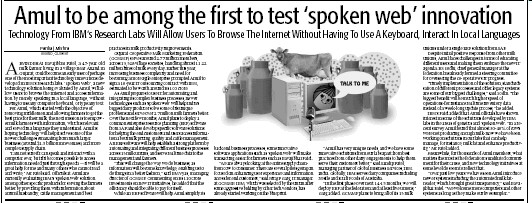- From: Arun Kumar <kkarun@in.ibm.com>
- Date: Tue, 6 Oct 2009 22:42:19 +0530
- To: public-mw4d@w3.org
- Message-ID: <OF44E8EAFF.CEA6AFF0-ON65257647.0017DACA-65257647.005DC1B3@in.ibm.com>
Dear All,
Thought that the news announcement below might of interest to the group.
(http://economictimes.indiatimes.com/Food/IBMs-spoken-web-to-ramp-up-Amuls-milk-business/articleshow/5093314.cms)
thanks and regards
Arun Kumar
Spoken Web (aka World Wide Telecom Web :
http://domino.research.ibm.com/comm/research_people.nsf/pages/arun_kumar.WWTW.html)
"Websites that use the spoken word will empower the illiterate" -
http://www.economist.com/sciencetechnology/displaystory.cfm?story_id=13855374)
------------------------------------------------------------------------------------------------------------------------------------
(Embedded image moved to file: pic11477.jpg)
Amul to be among the first to test ‘spoken web’ innovation
Technology From IBM’s Research Labs Will Allow Users To Browse The Internet
Without Having To Use A Keyboard, Interact In Local Languages
Pankaj Mishra ANAND, GUJARAT
ARVINDBHAI Bavajibhai Patel, a 47-year old milk farmer living in a
village near Anand in Gujarat, could become an early user of perhaps one of
the most important technology innovations developed in IBM’s research labs.
‘Spoken Web’, a new technology solution being evaluated by Amul, will allow
users to browse the Internet and access information by merely speaking in a
local language, without having to use any computer keyboard, or type any
text.
For Amul, which started with the objective of removing middlemen and
allowing farmers to get the best price for their milk, the next mission is
to empower milk farmers with information, which is relevant and served in a
language they understand. Amul is hoping technology will help it solve some
of the newer challenges emanating from much larger business (around $1.5
billion in revenues) and more complex supply chain.
“I am not sure if I can speak and interact with a computer ever, but if
it becomes possible to access information needed just through speech — it
will be a great help for me and many others who cannot read and write,” Mr
Patel said. Officials at Amul are currently evaluating IBM’s ‘spoken web’
solution among other specific products for serving the farmers better by
providing them with information about animal husbandry, cattle management
and best practices in milk productivity improvements.
Gujarat Cooperative Milk Marketing Federation (GCMMF) serves around
2.79 million members, across 13,328 village societies, handling almost
11.22 million litres of milk every day. Earlier this year, increasing
business complexity and need for becoming a more agile enterprise prompted
Amul to sign a 10-year IT outsourcing contract with IBM, estimated to be
worth around Rs 100 crore.
As Amul prepares to use IT for automating and integrating its complex
business processes, newer technologies such as ‘spoken web’ will help
India’s biggest dairy producer solve some of its unique problems and serve
over 2.7 million milk farmers better. Over the next few months, Amul plans
to deploy a common enterprise resource planning (ERP) software from SAP and
also develop specific software solutions for helping the end customers and
users access information about milk pricing, quality and cattle management.
An ERP software will help establish a strong platform by automating and
integrating different business processes across 13 milk unions, and serve
real time data to the management and farmers.
“This will change the way we do business, as information will become
knowledge, enabling us to do things in a better fashion,” said BM Vyas,
managing director of GCMMF. Commenting on Rs 110 crore investments on new
IT initiatives, he added that the efficiency should be able to pay for
itself.
While an ERP software will help Amul simplify its back end business
processes, some innovative software applications such as ‘spoken web’ will
make transacting easier for farmers such as Bavajibhai Patel.
“We are always looking at the entire supply chainfrom cow to consumer.
There are several pilots going on focused on enhancing user experience and
information access for end customers,” said Niraj P Garg, IT manager at
GCMMF. IBM, which was selected by the union after some aggressive bidding
by other tech vendors, has already started working on the blueprint.
“Amul has very unique needs, and we have some innovative solutions from
our labs apart from best practices from other dairy engagements to help
them serve their customers better,” said Sandip Patel, managing partner of
Global Business Services, IBM India. Globally, IBM serves dairy companies
including Nestle and Kraft Foods of Australia.
“In the first phase over next 14-15 months, we will deploy ERP at the
federation and at least five unions,” Garg added. GCMMF plans to bring all
of its 13 milk unions under a single ERP solution from SAP.
Despite initial positive response from other milk unions, Amul faces
challenges in terms of educating different users and making them embrace
the new IT agenda. RS Sodhi, chief general manager at the federation has
already formed a steering committee for overseeing the co-operative’s IT
progress.
“Timely implementation of the solution, standardisation of different
processes and older legacy systems are some of our biggest challenges,”
said Sodhi. “The biggest benefit will be much higher speed of
operations-for instance real time inventory data instead of a week-long
update process,” he added.
IBM’s Patel added that Amul officials have shown interest in some of
the solutions developed by IBM labs in the areas of genetics and ‘spoken
web’. “In a recent survey Amul found that almost 30-40% of cows were not
producing enough milk-now we have been working on solutions in our labs
that can help manage, for instance, milk fat and enhance productivity,” Mr
Patel added.
Meanwhile, for thousands of Amul members, what matters the most is the
federation’s undiluted commitment for their cause, and new technology
initiatives at some level do seem to reflect that.
“Over past few years we have seen Amul introduce newer systems
including the automated milk fatreader, which brought great transparency,”
said Bavajibhai Patel. “We welcome more computers and other systems as long
as they make our lives simpler.”
Attachments
- image/jpeg attachment: pic11477.jpg

Received on Tuesday, 6 October 2009 17:12:47 UTC